Mrs. Anna Rosenberg, Assistant Secretary of Defense
When Anna Lederer Rosenberg raised her right hand on Nov. 15, 1950, she became the first woman to serve as an Assistant Secretary of Defense, the highest position ever held by a woman in the U.S. Department of Defense at the time.
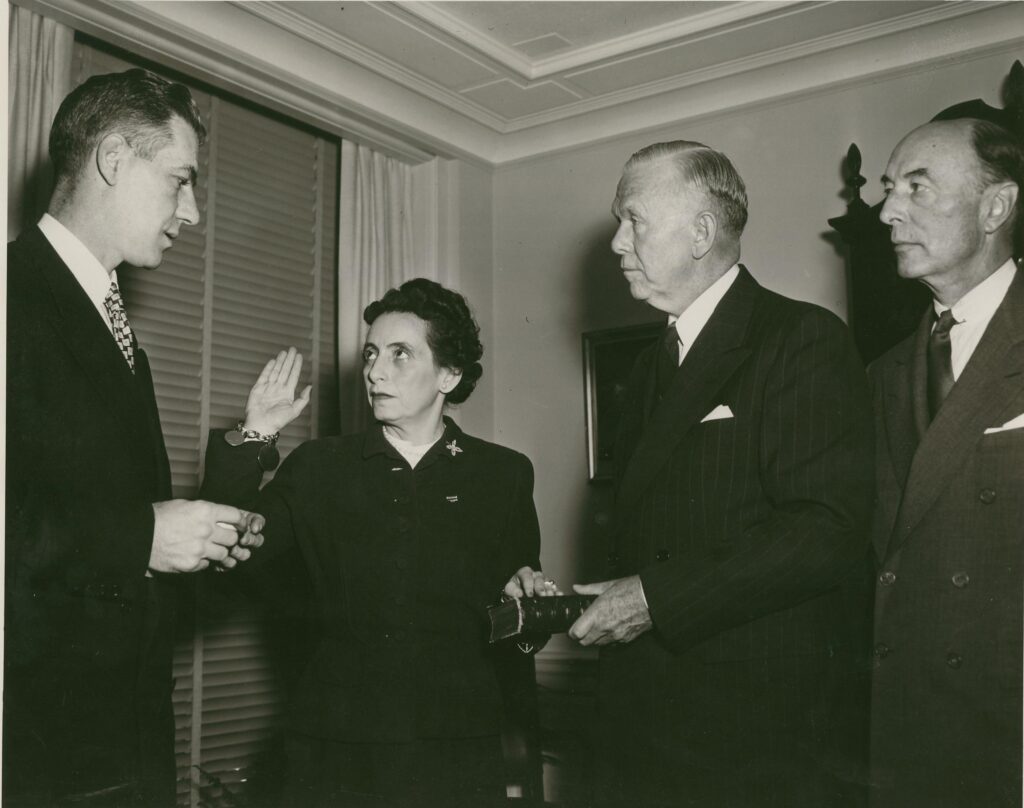
Anna Rosenberg being sworn in as Assistant Secretary of Defense on Nov. 15, 1950. Secretary of Defense George Marshall holds the book; next to him is Deputy Secretary of Defense Robert Lovett.
Anna Rosenberg was used to being first; she was the first woman to serve as the New York State Director of the National Recovery Administration, and the first woman to serve as a Regional Manager for Social Security in the 1930s. Her career would lead her to advise U.S. Presidents from Franklin Delano Roosevelt to Lyndon B. Johnson.
Anna Marie Lederer was born in Budapest, Hungary in 1901 and immigrated with her family to the United States in 1912, settling in upper Manhattan. She attended Wadleigh High School for Girls, the first girls public high school in New York City.
Anna married Julius Rosenberg after graduation. A speech she made advocating women’s suffrage brought her to the attention of local political leaders, and she managed campaigns for aldermen and assembly men in the early 1920s. In 1924 she opened her own public relations firm, specializing in employee and labor issues.
Rosenberg was known for her stylish hats and many bracelets. Her employees would hear her bracelets clinking as she walked down the hall, so she never surprised them by suddenly appearing in their offices.
In the early 1930s, she began working for the National Recovery Administration, becoming New York State Director in 1936. The next year, she became Regional Director for the Social Security Board.
During World War II, she served as Regional Director for the War Manpower Commission. In 1944, President Roosevelt sent Rosenberg to Europe to report on the needs of soldiers as they were demobilized. She recommended educational programs and encouraged the President to support the G.I. Bill.
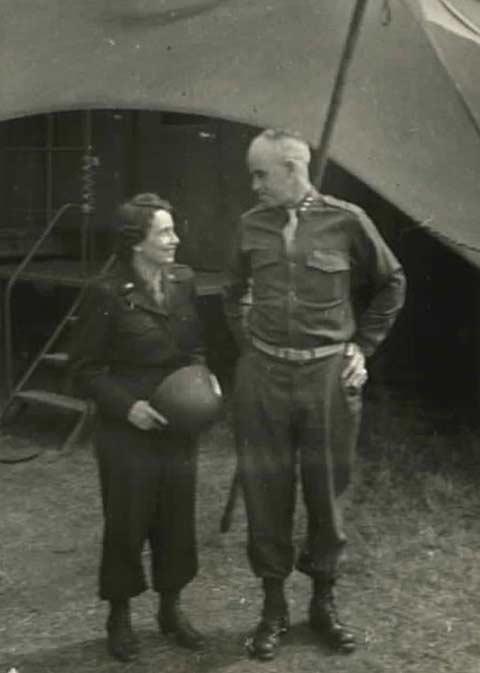
Anna Rosenberg visiting with Gen. Omar Bradley in Europe during World War II. Photo courtesy the Jewish Women’s Archive.
After the war, she ran her consulting business, and in 1950 was nominated by George Marshall for Assistant Secretary of Defense for Manpower and Personnel.
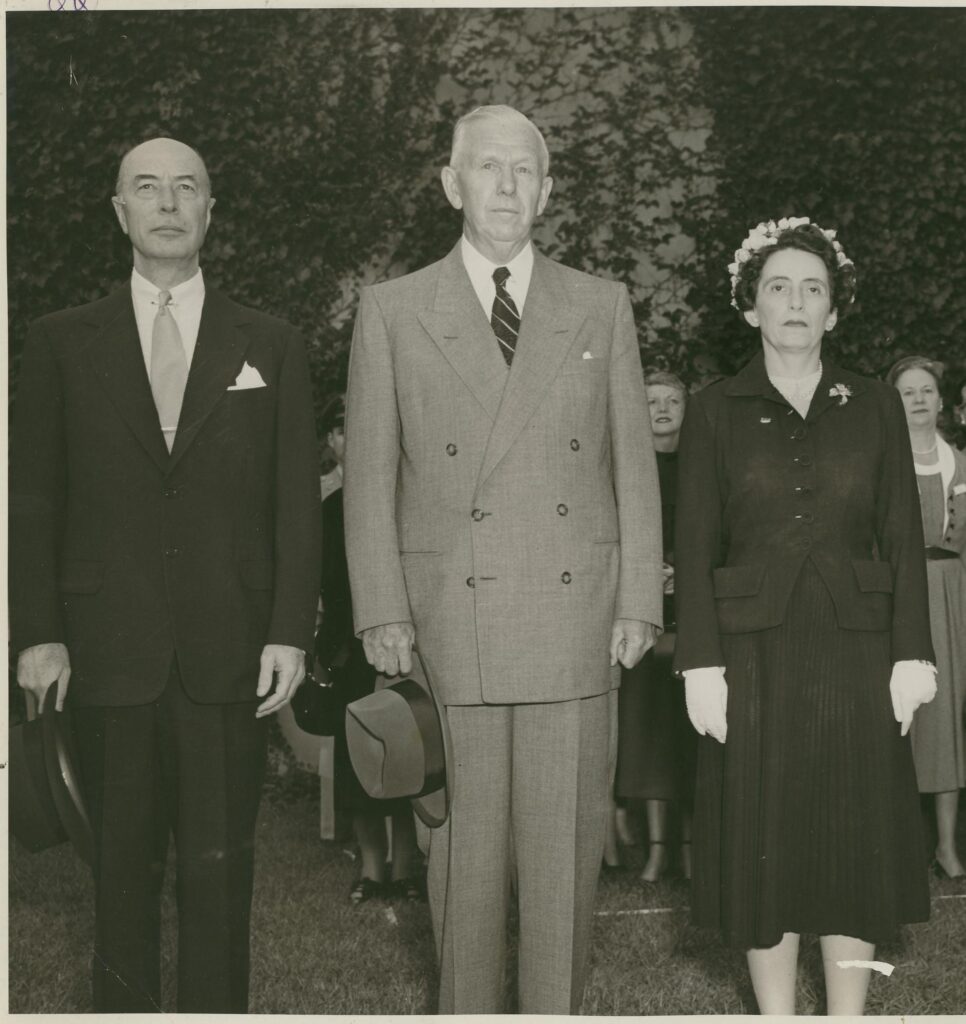
Defense Department personnel Robert Lovett, George Marshall, and Anna Rosenberg, September 1951.
Marshall said of her nomination:
I am delighted that I was successful in persuading Mrs. Rosenberg to undertake the office of Assistant Secretary of Defense.
During my few weeks as Secretary, I found tremendous pressures regarding manpower.
Preparing for this problem, I found the consensus of opinion was that one of the outstanding experts in the United States was Mrs. Anna Rosenberg.
The Defense Department is confronted with the formalization of the proposals to the Congress regarding our system for raising and maintaining our armed forces. This involves the question of Universal Military Training and the Selective Service Act procedures. I knew of no one who had had more experience regarding these issues than Mrs. Rosenberg because of her previous contacts both within and without the Army.
Therefore, I feel that I personally .and the Defense Department have been very fortunate in securing her reluctant agreement to serve as Assistant Secretary of Defense with special relation to manpower and personnel.
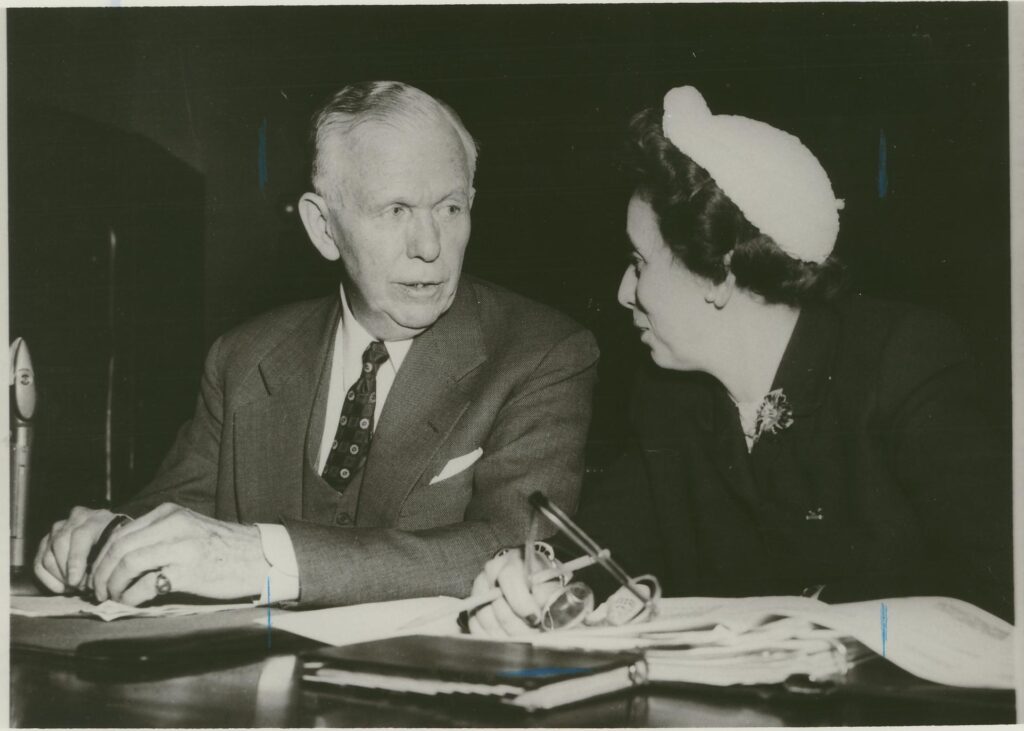
Secretary George Marshall conferring with Assistant Secretary Rosenberg while testifying in front of the House Armed Services Committee.
Some senators supported Rosenberg’s appointment. Sen. William Benton of Connecticut wrote of Marshall’s nomination:
General Marshall’s appointment of Mrs. Rosenberg shows his talent as an executive. He of course knows that her experience embracing labor management relations and manpower problems, over the past 17 years, is unrivalled by any man or woman anywhere.
He knows she is better qualified for this role-not merely than anyone he can get–but than anybody, anywhere.
Rosenberg, a lifelong Democrat, was opposed by Sen. Joe McCarthy for supposed connections to the Marxist John Reed Club. Anna Rosenberg told Marshall biographer Dr. Forrest Pogue:
I had his complete backing. I was almost his Dreyfus case. He told me when all this started, people after me are going to go after you. When this matter came up about my appointment, I went to him and said I am willing to resign. It was the only time I saw him get mad. He said I told you this would happen.
An FBI investigation into perjured testimony before the Senate Armed Forces committee cleared Rosenberg, who was unanimously recommended by the Senate Armed Services Committee. She worked on implementation of the National Security Act, promoted racial integration of the services, and supported legislation safeguarding the rights of minorities in the military.
In the 1950s, Rosenberg served on several New York City boards. She was a great friend to Dwight D. Eisenhower, assisting in his career change from the military to politics. She was a frequent face in President John F. Kennedy’s circle of advisors, and Rosenberg advised President Lyndon B. Johnson on the effects of automation on jobs and the job market.
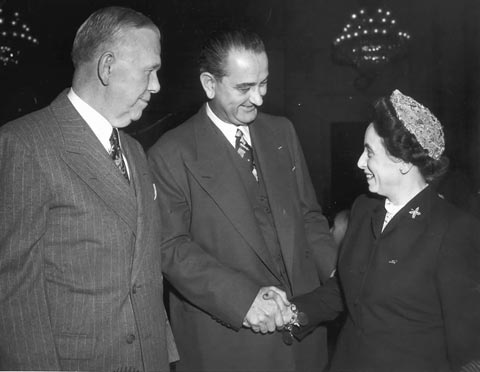
Secretary George Marshall, Senator Lyndon Johnson, and Assistant Secretary Anna Rosenberg.
In 1962, Rosenberg divorced her first husband and married Paul Hoffman, an automobile corporation executive and first administrator of the European Recovery “Marshall” Plan and a United Nations Official. They were a “power couple” during their retirement years until Hoffman’s death in 1974.
Rosenberg Hoffman died in New York City in 1983.
Before becoming director of library and archives at the George C. Marshall Foundation, Melissa was an academic librarian specializing in history. She and her husband, John, have three grown children, and live in Rockbridge County with two large rescue dogs. Melissa is known as the happiest librarian in the world! Keep up with her @MelissasLibrary.
